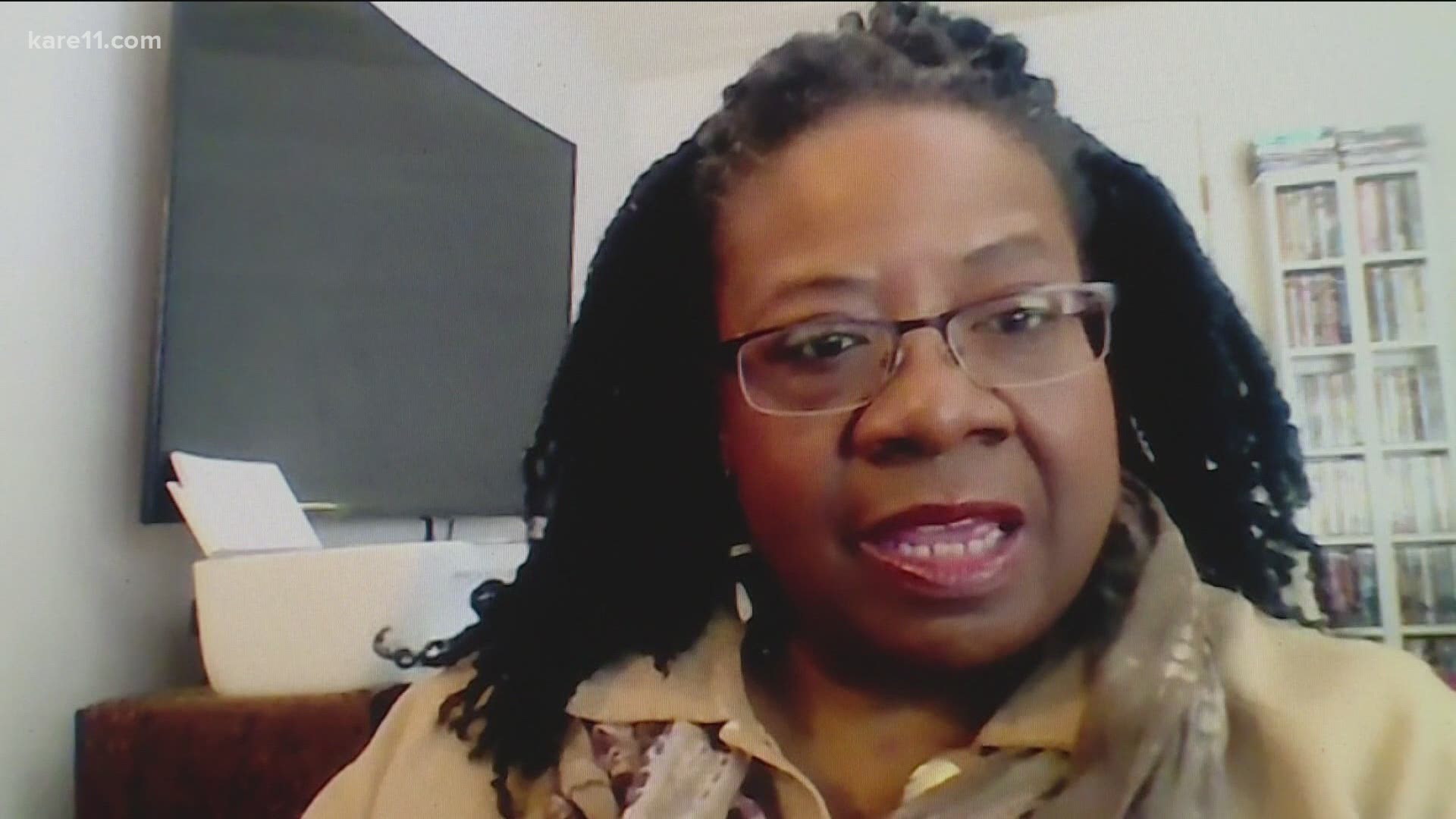MINNEAPOLIS — Watching grief and trauma unfold repeatedly during the Derek Chauvin trial is hard for anyone, even a clinical psychologist.
"The first thing that comes to mind for me is that nobody should have to see or witness someone being killed in front of them," said Dr. BraVada Garrett-Akinsanya, director of the African American Child Wellness Institute in the Twin Cities.
Dr. Akinsanya says it's hard enough for those of us who have witnessed video of Floyd's death second hand, and she recommends following the trial in small, manageable doses. That's not an option for those in the courtroom. Wednesday morning, a juror in the Chauvin trial revealed that she was suffering from a lack of sleep following a day of emotional testimony and watching multiple videos of the deadly incident.
Still, Dr. Akinsanya says the trauma experienced by witnesses is compounded even more.
"This re-living of the experience in a high-stakes condition is something that makes it even more important that we have follow up after this trial, or after their testimony," Dr. Akinsanya said. "The more immediately we do it, the quicker and the better the recovery can become."
Dr. Akinsanya says that recovery is even more critical, and challenging, in this trail because so many witnesses are in their teens and early 20's.
"Our research shows us that until they are 25 or 26 years old, that's when the brain development is pretty much complete," she said. "So what that means is, they process what they see and they don't understand the context of it. They just know it's scary and it hurts."
Dr. Akinsanya says, that's why on consecutive days we've repeatedly heard witnesses, specifically young people, express feelings of regret.
"Part of trauma recovery is developing a narrative, and that narrative is to create a corrective experience and so we obsess or think about it over and over again," she said. "It happens on a normal, everyday basis, when you say, 'Oh, I wish I had done... I wish I had said... or maybe I could have.' But the thing that is messing with the minds of children that makes it more severe is that their options and their ability to come up with various options are limited. They take more responsibility for it because they don't have that ability to rationalize it out in other ways."
Kent Erdahl: "You can understand in a case like this, of this importance, with so many young people witnessing it, that the state would have to call them to testify in some situations, but what do you hope they get in terms of attention?"
Dr. Akinsanya: "It's more than a hope. I think the situation demands that they have professional support and that the parents have professional support and that those around them have enough support and skills to know that there are things they need to do, specifically related to the developmental needs of these children who experience the world as a very scary place right now."
In response to questions about the mental and emotional support offered to witnesses in the Chauvin trial, the Hennepin County Attorney's Office provided the following statement to KARE11:
While our office cannot comment on specifics from the State vs. Chauvin trial, what we can do is provide a general overview as to how victim witness staff from our office work with witnesses.
You asked about younger witnesses, and how our office supports and prepares them for a court proceeding. For children under 12 years of age, those witnesses receive a child abuse advocate as opposed to a case management assistant. Any witness over the age of 12 is assigned to a victim witness advocate, or a request for a child abuse advocate can be made.
Pre-pandemic, victim witness staff would commonly make home visits to introduce themselves to the child and their care providers. Child witnesses were also introduced to the prosecutor(s) at the office, were shown the courtroom where they would testify prior to trial, and received a tour of the facility.
Regarding trial preparations, this generally occurs after the child witness, their care givers, and a victim witness advocate have met a few times to build a rapport. This relationship over time creates comfort and support the child can rely on during court proceedings. Advocates will also suggest the child bring something that soothes them, like a stuffed animal, or will offer worry stones or fidgets to make the child more at ease. During a trial, advocates will remain in the courtroom as support for the child.
Another important aspect is how the advocates guide the child witness through the process, offering helpful suggestions and support during each stage of the court proceeding. The goal is always relationship building between the advocate and child witness, to ensure they feel safe and respected throughout the trial.
During the pandemic, many of the in-person meetings were scheduled through remote video meetings with the child witness, their care givers, and the advocate(s). This process mimicked pre-COVID 19 conditions, and afforded each party to interact with one another, and create a relationship built on trust and understanding.
As for witnesses 18 years or older, they receive similar support, in addition to victim witness advocates finding resources like therapeutic support, keeping them updated on court proceedings, offering opportunities to confer with the prosecutor(s), and giving feedback on the case.
To further support witnesses during court proceedings, our office employed an emotional support animal named Barrett who joined in December 2019. Since then, Barrett has been an integral part in offering stress and anxiety-relief to those who appear in court.
Additional information on our victim witness division, please visit our site.

